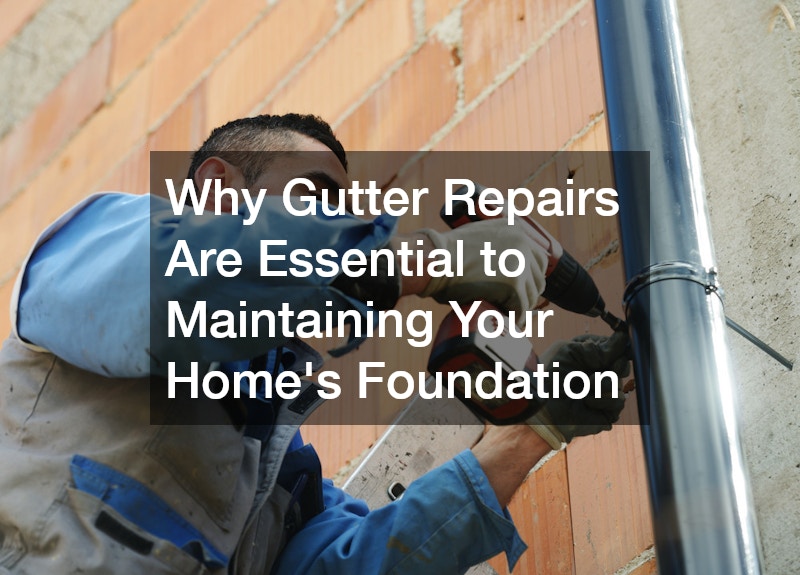Gutters may not be the most glamorous aspect of your home, but they play a crucial role in its overall health, especially in protecting the foundation. These often-overlooked components of a home serve as the first line of defense against the elements, directing rainwater and meltwater away from the structure. This article explores the importance of gutter repairs and why keeping your gutters in good condition is vital to maintaining the integrity of your home’s foundation.
How Do Gutters Protect Your Home’s Foundation?
At first glance, gutters may seem like a simple drainage system, but they are essential in protecting your home from water-related damage. The primary function of gutters is to collect rainwater from your roof and channel it safely away from the foundation.
Without gutters, rainwater would flow directly off the roof and pour down around the base of the house, leading to pooling water and soil erosion. This excess water can seep into the foundation, causing cracks, shifting, and, over time, structural instability.
When functioning correctly, gutters direct water into downspouts and away from the house, often into a drainage system designed to carry the water far from the structure safely. This system helps prevent water from accumulating around the foundation, where it can cause pressure on the walls or seep into the basement. Without proper water management, the foundation can begin to crack, settle unevenly, or even sink.
What Are the Signs That Your Gutters Need Repair?
Gutter wear and tear can occur over time, especially if they aren’t properly maintained. Spotting the signs of damaged gutters early can prevent expensive repairs down the road. One of the most common indicators that your gutters need repair is if you notice water leaking or puddling around the foundation. Leaks can occur due to cracks, loose connections, or clogged gutters, and if left unaddressed, these issues can lead to water damage around the foundation.
Another sign that your gutters need attention is overflowing during rainfall. When gutters become clogged with leaves, twigs, or dirt, they can no longer effectively direct water away from the house. Overflowing gutters fail to perform their task, which can lead to similar risks of foundation damage. Similarly, if you observe your gutters sagging or pulling away from the house, this is a clear sign that they are no longer securely attached and will not efficiently channel water.
Finally, if you see visible rust or corrosion on your gutters, it’s a sign that they are exposed to excess moisture or simply old and need replacement. Corroded gutters may leak, and the holes created by the corrosion can contribute to water draining improperly around the house. Addressing these signs promptly can help preserve the integrity of your gutters and, by extension, the foundation of your home.
What Are the Consequences of Ignoring Gutter Repairs?
Ignoring gutter repairs may seem minor, but can lead to severe and costly consequences. When neglected, gutters fail to perform their essential task of directing water away from the foundation. Water allowed to pool near the house’s base can lead to several damaging outcomes. First, standing water around the foundation can seep into the home, causing moisture damage to the walls, floors, and basement.
Excess water around the foundation can wash away the soil, destabilizing the ground under the house. Erosion can lead to settling or shifting of the foundation, which may result in cracks and misalignment. The most serious consequence of clogged or broken gutters is foundation damage. Water that isn’t properly diverted can saturate the soil around the foundation, leading to pressure that can cause cracks or even significant shifts in the foundation.
How Can You Ensure Your Gutters Are Properly Maintained?

Maintaining your gutters is relatively simple but requires some regular attention. One of the best practices for keeping your gutters in good shape is to inspect them at least twice a year, preferably during the spring and fall. During these inspections, look for any signs of wear and tear, such as cracks, rust, or clogs. It’s also important to check the downspouts to ensure they are clear and directing water away from the foundation. If the downspouts are clogged or misdirecting water, this could compromise the effectiveness of your entire gutter system.
If you notice small leaks in your gutters, they can often be sealed with a waterproof sealant. This can temporarily resolve minor issues, but more extensive repairs may be needed if the damage is significant. For more complicated repairs, such as sagging gutters or problems requiring working at a height, it’s best to call a professional. A roofer or gutter specialist can ensure the job is done correctly and safely, especially when securing gutters or replacing old, damaged sections.
Gutters may seem like a minor feature of your home, but they are vital in protecting your home’s foundation from water damage. Regular gutter maintenance and prompt repairs are essential in preventing costly foundation issues. By identifying signs of gutter problems early, addressing them promptly, and following best practices for maintenance, you can ensure that your home remains structurally sound for years to come. Protect your foundation and home by treating gutter care as a priority—it’s an investment that can save you time, money, and stress in the long run.


